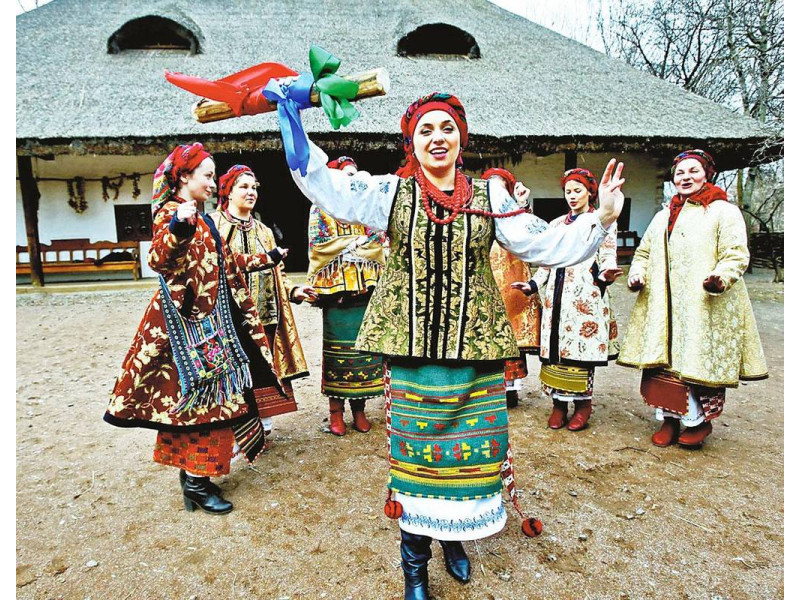Maslenitsa is an ancient holiday that marks the meeting of winter and spring, the beginning of a new life cycle, the revival of the vital forces of nature and all living things on earth, and prepares us for Lent.

Ukrainian Maslenitsa, date of celebration
Maslenitsa, Zapusti, Puschennie, The Last Cheese-Pour Week, Syrnitsa, Kolodiy, Kolodka, Maslenitsa, and also Babske seva, Cheese Sunday, Zagalnitsa — in Ukraine this holiday has many names.
This holiday closely intertwines elements of pagan mythology and Christianity. Even in pre-Christian times, Maslenitsa was celebrated in honor of the spring equinox, which was considered the beginning of the new year. Our ancestors' New Year began with the first spring New Moon.
The holiday received its current name after the adoption of Christianity in Russia. With the advent of Christianity, the church preserved the old custom of welcoming spring, but timed it to the beginning of Great Lent.
This is how we know the church holiday of Cheese Week, or Meat Festival.
In Christianity, the date of the celebration of Maslenitsa is tied to Easter.
The celebration of Maslenitsa (modern Maslenitsa) begins a week before Lent, which in turn begins 7 weeks before Easter.
This year, Maslenitsa 2020 will last from February 24 to March 1.
The very names of the holiday speak of its ancient roots and the path it has taken from the foundations of folk belief to the present day.
In Ukraine, the name "Masnytsia" comes from the word "masny", meaning "fatty", meaning something that contains a lot of fat, butter, and refers to the fact that for the last week we have the opportunity to eat fatty foods. For seven days in a row, it is allowed to eat butter, eggs, and dairy products, but not meat (fish is allowed). Since this was the last celebration before the strictest fast, it was celebrated loudly, cheerfully, and deliciously, with large fairs with music, songs, and a variety of entertainment.

We already know Maslenitsa with pancakes and modern entertainment, but even before the advent of Soviet power, Ukrainian Maslenitsa was different.
Our ancestors also celebrated the holiday of Kolodiy, one of the ancient Slavic holidays that dates back to the Trypillian culture. It is a series of rituals in honor of the spring awakening of nature.
With the advent of Christianity, our Kolodiy began to be called Myasnitsy, Maslenitsa, Syropust, Syropusny Week, Cheese Sunday. The first mentions of Maslenitsa in the calendars of our ancestors date back to the 4th century AD (calendars from the village of Romashky in the Kyiv region and from Lepesivka - modern Khmelnytsky region). The holiday was actively celebrated not only during the pagan period, but also after the introduction of Christianity by Prince Volodymyr. The terms "Syropusny Week", "Syropust", "Syropusna Sunday" were used mainly in the calendars, church books and chronicles as early as the 16th century.
Maslenitsa Week was also called “Women's Week,” because during this period women were allowed to walk and have fun to their heart's content, while men were supposed to obey women and endure their “harms.”
In different parts of Ukraine, this festive period has always been called differently, and the rituals that accompanied it differ somewhat. At the same time, the meaning of the holiday has remained and was common to all regions.
Until the beginning of the 17th century, Maslenitsa was celebrated for three weeks.
The first was called Omnivorous — during this period, meat was allowed to be consumed daily.
The second was called Perestupny or Ryabiy — it was also allowed to eat meat (except on Wednesdays and Fridays).
The third week was called Syropusny, actually Maslenitsa, also known as Kolodiy, and was celebrated with the greatest pomp.
It is very important and significant that each day of the week-long Maslenitsa holiday had its own name, rituals, its own character of customs, ceremonies, signs and entertainment. These were like small holidays and dedications in a big holiday. Each of them has its own meaning and means something.
After the adoption of Christianity, Maslenitsa began to be observed on different days of the week. Each of them has its own meaning and name. And they also differed in regions.
On the last day of Shrovetide, “Forgiveness Sunday,” people asked for mutual forgiveness for offenses committed unintentionally or intentionally. When meeting, people bowed low to each other three times and said: “Forgive me!” In response, they said: “God will forgive.”

"Let's go, Kolodiyu, to our venture..."
As already noted, Maslenitsa has many names, one of which is Kolodiy.
The holiday of Kolodiy dates back to ancient Slavic times, before the baptism of Kyivan Rus. The main rite dedicated to Maslenitsa was "Kolodki".
Kolodiy or Kolodka - it is the traditions associated with these names that have the oldest roots. During Shrovetide, there was a custom to tie a kolodka to those who were still without a partner. In ancient times, it was a wooden block, log or stick. Kolodiy began to be celebrated at the beginning of the week.
On Monday morning, young married women gathered at a tavern, prepared a sumptuous feast, and celebrated Kolodka. One of the young women brought with her a log or stick, which served as a “kolodka.” Together, they wrapped the “kolodka” in a linen cloth, as if swaddling a baby. Then they congratulated each other: “Our “Kolodka” is born!”
On Monday, the "block was born", on Tuesday - "baptized", on Wednesday - "christened", on Thursday - "died", on Friday - "the block was buried", on Saturday - "mourning the block", and on Sunday the end of the "block"'s life took place. And, of course, all these events were of a humorous nature. By the way, on Wednesday, at the block's christening, there were the most pompous festivities, because on this day even unmarried people and small children were allowed to celebrate.
Young women tied a kolodok to the body of unmarried young men and women who had not married in the previous year. One of the motives for tying a kolodok was to punish young men and women who had not made friends, as well as their parents, for not marrying their sons or daughters in time. "If you have not married, then wear a kolodok!"
And since no one wanted to pull the block, they bought it off: with colored ribbons, dances, songs, food, drinks, or money. Remembering this custom, the young men prepared a "ransom" in advance. After the ransom, the block was untied. It was not proper to untie it yourself.
According to popular belief, Kolodiy, as a god and guardian of marriage, generously bestowed health, harmony, and prosperity on those who created families, and gave couples children.
Kolodiy is a purely Ukrainian holiday that has no analogues among other peoples.
This week was also called “Women's Week” or simply “Women's Week”, and Kolodiy, accordingly, was “Women's Holiday”. During this week, men were supposed to obey women. Women had a fun time, and in general, on Maslenitsa, it was forbidden to do heavy housework - weaving, chopping, spinning hemp, bleaching, sewing and embroidering.

"Wait, dumplings, Shrovetide is coming for you!"
Despite the fact that the most familiar dish for us today is pancakes, in ancient times in Ukraine during Maslenitsa Week, during the holiday, Ukrainians more often ate dumplings.
But there are also references to the fact that in some regions, for example, in the Slobozhanshchyna region, buckwheat pancakes were fried, which were seasoned with lard. They were served throughout the week.
Dumplings, symbolizing the new Moon, were prepared with cheese, which were eaten with butter or sour cream. It was female energy that was compared to the moon, and dumplings in shape resemble a crescent moon. It is not for nothing that one of the names of Maslenitsa is Babi Week. Dumplings were eaten by everyone in the family, and guests were treated to them. Dumplings were a priority this week. According to ethnographers, in Central Ukraine they did not even cook borscht.
In addition to dumplings, other dishes based on dairy products were prepared: cheese cakes, cheese baby, pancakes, and casseroles, noodles and dumplings were also cooked in milk. And from milk they made fermented baked milk, kolotukha, rostyachka, kissel. Pancakes were also prepared because this week they said goodbye to butter, cheese, eggs, fermented baked milk, and kefir.
During this time, butter, sour cream, and milk were consumed in abundance. All porridges were also prepared exclusively with milk during this week.
Today, the more common name for Maslenitsa is Maslyana. Nowadays, Maslenitsa is celebrated mainly with pancakes.
And as they used to say: “Shrovetide, Shrovetide, what a Shrovetide you had – if only you had seven Sundays, and only one Lent!”

So, our Ukrainian holiday of Kolodiy has existed in Ukraine since the time of the Trypillian culture. As we can see, it changed during the introduction of Christianity during the time of Kyivan Rus and up to the present day.
Like all folk holidays and customs, it acquired a Christian religious meaning, only some celebration traditions remained unchanged.
The traditional end of the Maslenitsa festivities is the burning of a huge effigy of Maslenitsa (Winter), symbolizing the farewell to the cold and the birth of Spring and new life.
We sincerely congratulate you on the holiday of Maslenitsa, Maslenitsa, and our Ukrainian Kolodiy! We wish you plenty of sweet dumplings and pancakes!
Let's remember and respect our ancestral Ukrainian traditions and appreciate what is Ukrainian!


Write a comment